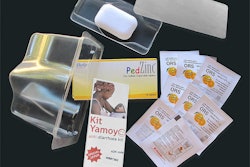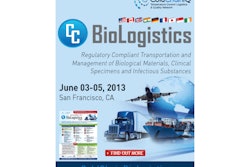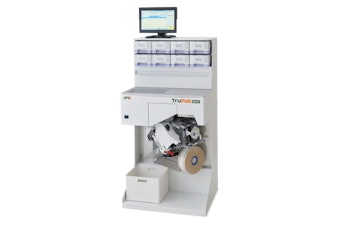Packaging innovation is honored every year by DuPont in its global packaging competition, but for this year’s silver anniversary edition, a “unique packaging and distribution program” captured the premier Diamond and the Special 25th Anniversary Food Security award.
Adding a distribution element is a differentiator for ColaLife, an independent nonprofit organization that leverages the Coca-Cola Co. (TCCC) distribution network to transport “AidPod” packages containing medicine and information to the needy in remote areas.
AidPod is the name of a registered distribution packaging system whose design inspiration was to utilize the space surrounding bottles in a crate of Coca-Cola during distribution. The first application of this technology is a one-year trial for the wedge-shaped anti-diarrhea Kit Yamoyo (“kit of life”) package that nests or “piggybacks” between bottlenecks within the crates to minimize transportation cube.
The ColaLife Operational Trial Zambia (COTZ) involves the AidPod anti-diarrhea kit. If the trial is successful, it could be used globally for other medical kits. ColaLife worked with pi global to create a robust container to carry simple medicines. It had to be small enough to only occupy the unused space between Coca-Cola bottles in crates, yet big enough to fit a large-enough dose of the essential medicines. They also had to ensure that they kept to strict medical guidelines set by the Pharmaceutical Regulatory Authority of Zambia.
According to pi global, “All branding and instructions are in a leaflet slotted into the kit package’s lid. This means that the plastic remains clear, thus rendering it potentially suitable for SODIS (solar water disinfection). The AidPod is also used as a measuring jug so that the Oral Rehydration Salts [contained in individually wrapped sachets within the pack] are mixed directly into it so the measurements are correct and most effective. It will be the first container in Zambia offering customers the ability to make up an individual required dose rather than a minimum of one liter of bulk fluid. The lid prevents contamination and allows the mixture to be fully dissolved via shaking while also used as a cup.”
Pi global, an independent global branding and design consultancy, reached out to its packaging supplier contacts to provide time, knowledge, and resources to the ColaLife project. All kit packaging materials (container, inner tray, and sealing film) are manufactured in the U.K. However, when the trial goes national, the AidPod will be capable of localization due to its low-tech manufacture. The contents of the Kit Yamoyo are procured as locally as possible and are assembled and packed in Zambia by hand, using a PA215 semi-automatic heat sealer supplied by Packaging Automation Ltd. The tabletop machine was appropriate to export to Zambia, easy to use, effective, accurate, and required no compressed air.
The package includes the following components:
• A rigid thermoformed container made of 90% rPET (recycled PET) by Charpak. The rPET is sandwiched between two thin layers of PET. The container measures 126 x 60 x 86 mm deep. Total thickness is 0.80mm. An inner tray is 112 x 53 x 15 mm deep.
• A film lidding from Amcor Flexibles that covers only the sealing flange area of the AidPod container to seal it closed. The film is a P-Plus® perforated 40-micron Mylar® OL2 material that ensures an integral seal with a smooth peel, and tiny perforations allow rapid changes in pressure caused by temperature and altitude to be dissipated, while maintaining pack integrity. There is no branding on the pack. Information is provided via a Kit Yamoyo packaging insert leaflet showing through the heat-sealed film lid.
Pack provides functionality
When asked how significant packaging is to making the project a success, ColaLife founder and CEO Simon Berry tells Healthcare Packaging, “The top criterion for the packaging was that it fit in Coca-Cola crates, so this meant we started with the packaging. Most health projects start with what needs to be delivered and then thinks what to deliver it in and the answer is usually a [paper]board box. Because we had such a sharp focus on the packaging and the needs of our end users, the packaging has ended up being much more than a container to hold the components of the kit. It's also a measuring device for the water needed to mix the ORS; it's a mixing and storage device, and a cup. This functionality, plus the fact that it is a shiny, clean-looking product with an unusual design, has made it very attractive to our target group—the rural poor. Good design is not only for the rich!”
Initially, the program is in a one-year trial period that concludes Sept. 30. “We have just completed the fieldwork for the midline survey which will provide initial evidence for the planning of a scale-up. In the first six months retailers serving the remote communities we are targeting have purchased 20,500 kits,” adds Berry.
The need to battle disease in Africa
Eric Connolly, production director, pi global, provides important background information as a point of reference why the pack is so necessary. He says that today, diarrhea is the second-biggest killer of children under the age of five in Sub-Saharan Africa. “It kills more children than malaria, HIV/AIDS, and measles combined. Our 'Human-Centered Design' approach focuses on meeting the needs of poor caregivers/mothers in remote rural areas with a sick child: an all-in-one kit, meeting best medical recommendations (ORS plus zinc), with local access/ease of delivery; promoting awareness/understanding; affordable; attractive; and with functionality including hygiene and measuring for correct dosage.”
He says AidPods are designed to counter African public health problems (transport costs, stock-outs) by moving simple cures to the private sector. “ColaLife has learned a lot from studying Coca-Cola's 'value chain' and how they operate: creating a desirable product and making it profitable for small retailers to carry it to their village. The Kit Yamoyo’s are ordered by independent Coca-Cola wholesalers in district towns (it could be any wholesaler, but the Coca-Cola wholesalers are generally of a high standard, well-known locally by everyone, and the project was introduced to them via SABMiller in Zambia. Travel on tarmac to the district towns is not difficult, so, during the current trial, the Kit Yamoyos do not go in crates on this leg. They are transported in boxes to the Coca-Cola wholesaler by Medical Stores Limited, but dropped at the Coca-Cola wholesaler.”
He explains that retailers come into the district town to buy and travel back “the last mile” on a bicycle, ox cart, or truck. “If they buy Coke as well as Kit Yamoyos, they have the option of putting the kits in the crate, thus saving on transport costs,” Connolly notes, saying this is not a requirement of the project—the AidPod shape just facilitates this.
“The pack provides a hygienic cup with a lid, valued for reuse in poor households where implements are few. It contains soap for handwashing and educational materials on diarrhea and hygiene. The AidPod protects the product in the harsh Zambian retail supply chain withstanding severe impacts, rapid changes in temperature and pressure, rough handling, light, water, dust, and insect exposure, and can be checked against counterfeiting.”
Chris Griffin, pi global’s chief operating officer, credits Berry and business development director Jane Berry for providing “this amazing concept for getting medication to rural areas piggy-backing on what they call ‘the last mile’ of the Coca-Cola distribution system.” He adds, “Our role was to take this idea and make it real. It wasn’t about making a lovely-looking piece of packaging to attract consumers, but instead a functional and sturdy container to deliver this medication safely. The AidPod is the result, a simple, well-constructed rPET container that will help parents in developing countries protect their families from easily treated diseases. ColaLife has been a truly exciting project for us to work on, and we can’t wait to see the fantastic results it will deliver in the future.”
In addition to the DuPont awards, Kit Yamoyo also won Product Design of the Year 2013 from The Design Museum.
Jane Berry comments, “When we asked Coca-Cola how they reached rural areas, they said, ‘We don’t—it’s the pull of the brand.’ Besides harnessing the unused space in a crate, this is what we’ve tried to learn from. We aimed to make Kit Yamoyo attractive, affordable, and desirable so people want it. Pi global has helped us make it also useful, robust, and practical. We have some of the world’s biggest brands watching and learning: UNICEF and WHO, as well as Coca-Cola, SABMiller, and Johnson & Johnson. It’s going to be interesting!”
Does ColaLife envision making any changes in the packaging for future projects? Berry says, “We will keep the packaging design under review with our partners pi global. Just because the current design has received so much attention and won awards doesn't mean there is no scope for improvement. We will always be sensitive to our customers' needs and they will dictate any future developments of the packaging.”
Watch a video on the project here.





















